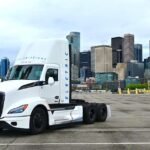Stellantis Abandons Development of Hydrogen Fuel-Cell Vehicles
Stellantis, the automotive conglomerate behind popular brands such as Citroën, Fiat, and Peugeot, has made the decision to halt the development of hydrogen fuel-cell vehicles. This move comes as a result of the company canceling the launch of its new hydrogen-powered medium and small vans, redirecting research and development resources to other projects.
The primary reason cited for this decision is the lack of demand for hydrogen fuel, stemming from the sparse fuelling infrastructure and high costs associated with it. Stellantis does not anticipate a significant uptake of hydrogen-powered vans until at least the 2030s, leading to the discontinuation of these vehicles. The substantial investment required for the development and production of hydrogen vans also played a significant role in this decision.
Speaking on the matter, Jean-Philippe Imparato, Stellantis’s chief operating officer for Europe, stated, “The hydrogen market remains a niche segment, with no prospects of mid-term economic sustainability.” As a result, the company will shift its focus towards hybrid and electric vehicles to comply with stringent CO2 regulations in Europe.
Despite the cancellation of the hydrogen van projects, employees at the manufacturing facilities in Hordain, France, and Gliwice, Poland, will not face layoffs. Stellantis is not the only automaker reconsidering its hydrogen strategy, as BMW is evaluating the feasibility of introducing its first fuel-cell car to the UK market in 2028 due to infrastructure challenges.
Earlier this year, Renault’s hydrogen van joint-venture, Hyvia, faced liquidation due to similar infrastructural hurdles and high investment demands. The industry’s shifting focus towards electric and hybrid technology underscores the challenges facing hydrogen fuel-cell vehicles in the current market landscape.







